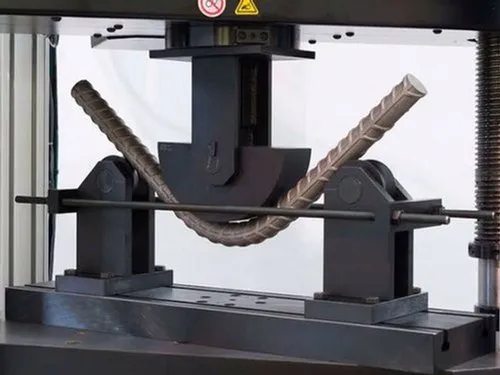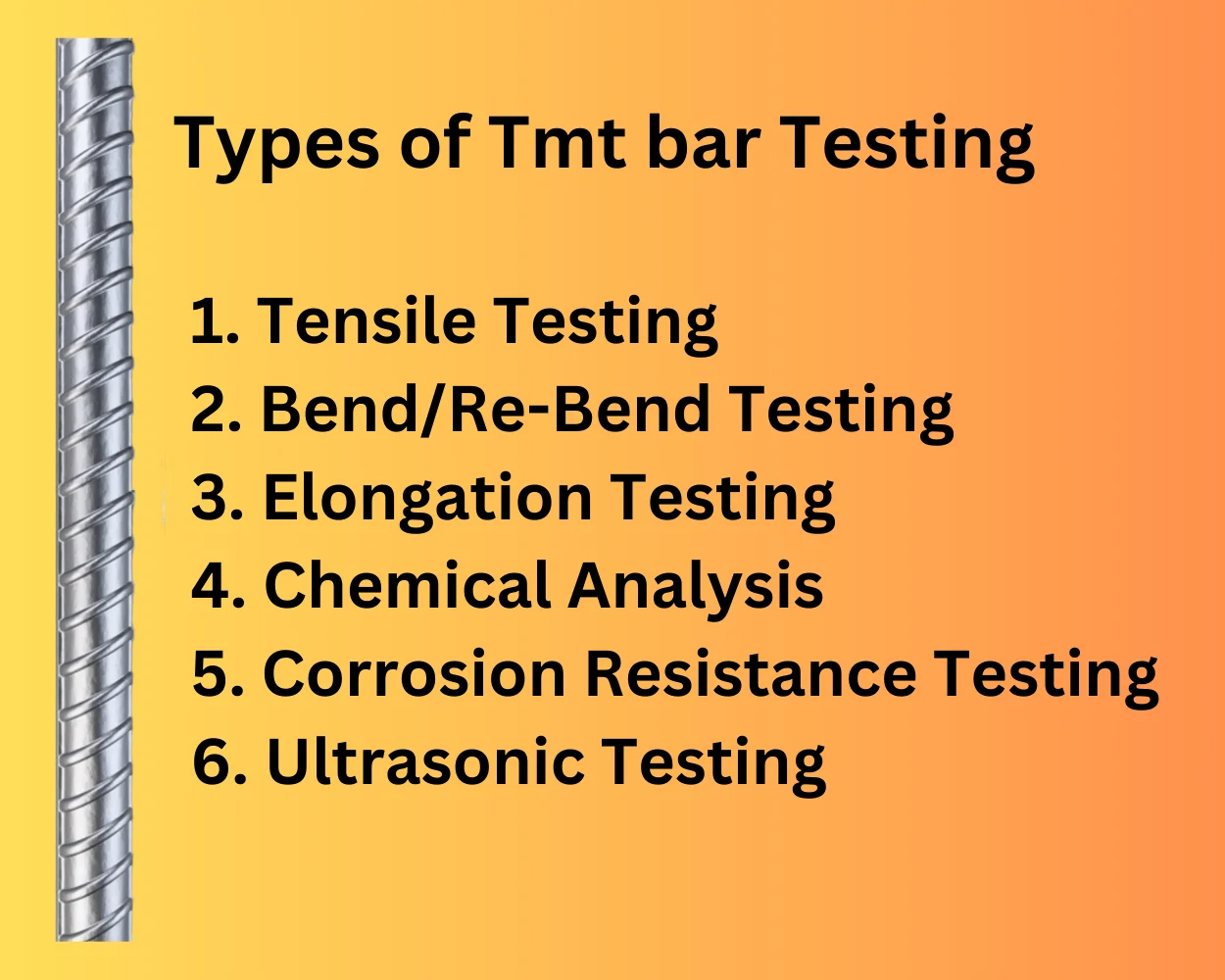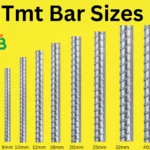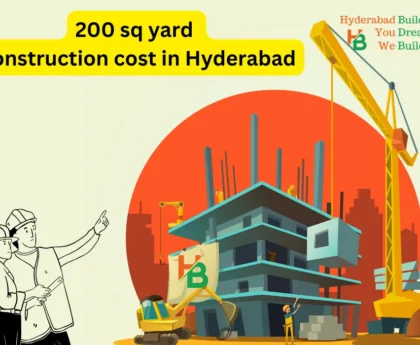Types of Tmt bar testing
Table of Contents
Toggle- Types of Tmt bar testing
- TMT Bar Testing After Manufacturing
- Types of TMT Bar Testing
- Now explore each of the types of TMT bar testing in more detail to understand their role in guaranteeing superior quality
- Tensile Testing:
- Bend/Re-Bend Testing:
- Elongation Testing:
- Chemical Analysis:
- Corrosion Resistance Testing:
- Ultrasonic Testing:
- Tensile Strength of TMT Bar in Hyderabad, India:
TMT Bar Testing After Manufacturing
The manufacturing of Thermo Mechanically Treated (TMT) bars involves intricate processes aimed at enhancing their strength, durability, and overall performance. However, the journey of a TMT bar doesn’t end with production; rigorous testing is a crucial step to ensure the bars meet stringent quality standards.
TMT bar testing refers to the various examinations and assessments conducted on Thermo-Mechanically Treated (TMT) bars after their manufacturing process. These tests are crucial to ensuring the quality, strength, and reliability of TMT bars, which are widely used in construction for their enhanced properties.
Let’s delve into the essential TMT bar testing procedures conducted after manufacturing to guarantee superior quality. Understanding the significance of different types of TMT bar testing is crucial for ensuring the quality and durability of construction materials.
Types of TMT Bar Testing
1. Tensile Testing
2. Bend/Re-Bend Testing
3. Elongation Testing
4. Chemical Analysis
5. Corrosion Resistance Testing
6. Ultrasonic Testing
Now explore each of the types of TMT bar testing in more detail to understand their role in guaranteeing superior quality
Tensile Testing:
Tensile testing is a fundamental mechanical analysis conducted to determine the tensile strength of TMT bars. This critical property is indicative of the material’s ability to withstand axial loads and stretching forces. Using a sophisticated Universal Testing Machine (UTM), a TMT bar undergoes incremental tensile stress until it reaches its breaking point. The resulting stress-strain curve offers insights into the mechanical behavior, ultimate strength, and elongation characteristics of the material. ASTM tensile testing
Bend/Re-Bend Testing:
Bend/re-bend testing is essential to evaluate the ductility and flexibility of TMT bars. The process involves subjecting a TMT bar to bending stress, simulating real-world construction scenarios. It ensures that the bar can undergo bending without developing surface cracks or defects. Additionally, the re-bend test assesses the material’s ability to regain its original shape after deformation, crucial for applications where flexibility is essential without compromising strength.

Elongation Testing:
Elongation testing provides a deeper understanding of the material’s ductile behavior under tensile stress. It quantifies the percentage increase in the length of a TMT bar before fracture, highlighting its ability to deform plastically without immediate failure. Higher elongation values signify superior ductility, enabling the TMT bar to absorb energy and undergo deformation without compromising its structural integrity.
Chemical Analysis:
Chemical analysis is a meticulous examination of the elemental composition of TMT bars. Utilizing advanced spectrometry, this process precisely identifies and quantifies elements such as Carbon, Phosphorus, Copper, Manganese, Chromium, and Sulphur. Strict adherence to specified chemical composition standards ensures the TMT bars meet the required metallurgical properties, corrosion resistance, and overall durability.

Corrosion Resistance Testing:
Corrosion resistance testing involves subjecting TMT bars to harsh environmental conditions or accelerated corrosion simulations. This rigorous evaluation assesses the material’s ability to withstand corrosion, a critical factor for longevity in diverse applications. TMT bars with robust corrosion resistance properties offer enhanced durability, making them suitable for challenging construction environments.
Ultrasonic Testing:
Ultrasonic testing is a non-destructive technique used to scrutinize the internal structure of TMT bars. Employing ultrasonic waves, this method identifies internal defects, voids, or irregularities that may compromise the structural integrity of the bar. Through detailed ultrasonic inspection, manufacturers ensure that TMT bars are free from hidden flaws, contributing to their overall reliability and performance in construction projects.
Benefits of different types of tmt bar test:
- When discussing the benefits of TMT bar testing, emphasize the importance of considering the diverse insights provided by the types of TMT bar testing. For example, “The combined results of Tensile Testing, Bend/Re-Bend Testing, and other TMT bar testing offer a comprehensive understanding
Tensile Strength of TMT Bar in Hyderabad, India:
The tensile strength of TMT bars can vary based on factors such as the grade of the TMT bar and the specific manufacturer. To obtain the accurate tensile strength of TMT bars in Hyderabad, India, you should refer to the product specifications provided by reputable TMT bar manufacturers or suppliers in the region. Manufacturers often provide this information to help customers make informed decisions about the suitability of TMT bars for their construction projects.
Many leading TMT bar manufacturers maintain in-house testing laboratories to ensure the quality of their products. These facilities are equipped with advanced testing equipment for conducting essential tests like tensile testing, bend/re-bend testing, elongation testing, chemical analysis, corrosion resistance testing, and ultrasonic testing. The in-house testing process enables manufacturers to closely monitor the quality of their TMT bars, ensuring they meet industry standards and comply with safety regulations. This commitment to rigorous quality control contributes to the manufacturers’ reputation and builds confidence among builders and engineers who rely on TMT bars for construction projects
1. Tensile Testing
2. Bend/Re-Bend Testing
3. Elongation Testing
4. Chemical Analysis
5. Corrosion Resistance Testing
6. Ultrasonic Testing
Bend/Re-Bend testing evaluates the ductility and flexibility of TMT bars, ensuring they can undergo bending without developing surface cracks. It is vital for applications requiring flexibility without compromising strength
Tensile testing is a crucial mechanical analysis that measures the ability of TMT bars to withstand axial loads and stretching forces. It provides insights into the material’s strength and elongation characteristics
Elongation testing assesses the ability of TMT bars to elongate under stress. It quantifies the percentage increase in length before fracture, indicating the material’s ductility and its capacity to absorb energy without breaking
Chemical analysis examines the elemental composition of TMT bars. It ensures adherence to specified chemical composition standards, confirming the required metallurgical properties, corrosion resistance, and overall durability.
Corrosion resistance testing evaluates how well TMT bars can withstand corrosion, a critical factor for longevity in diverse applications. Bars with robust corrosion resistance offer enhanced durability in challenging construction environments.
Ultrasonic testing is a non-destructive technique that scrutinizes the internal structure of TMT bars. It identifies internal defects or irregularities, ensuring bars are free from hidden flaws that could compromise structural integrity.




